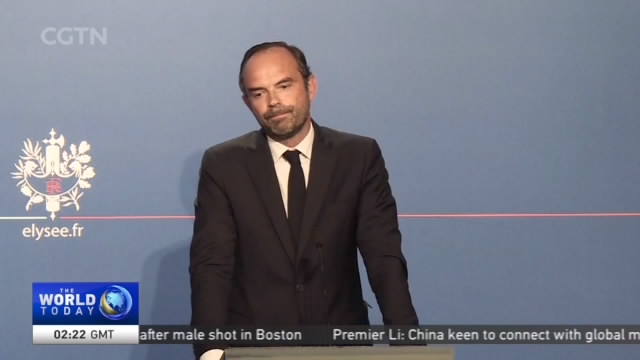
10:53, 13-Sep-2017
France Protests: Labor union demonstrators denounce President Emmanuel Macron

Labor union protesters took to the streets in Paris and across France on Tuesday to denounce President Emmanuel Macron's new labor reforms. Macron wasn't around to witness the demonstrations, as he's touring hurricane damage left behind on the French Caribbean islands of St. Barts and St. Martin. Nevertheless, union members are calling for economic and social change. Our correspondent Mariam Zaidi has the story.
A strike organized by one of France's biggest labor unions - the far left General Confederation of Labour - brought tens of thousands to the streets of central Paris. It's the first real show of discontent against President Emmanuel Macron who took office in May. Just four months in office, Macron says he's offering France the chance to liberate itself from three decades of inefficiency. Executive orders are expected to begin at the end of the month and overhaul the country's complex labor laws.
EDOUARD PHILIPPE FRENCH PRIME MINISTER "The country needs transformation and the French know it. If they had wanted the previous orientations to continue, they would not have chosen to elect Macron to the presidency."
In France, rights for workers are highly guarded, making it difficult for businesses to hire and fire. But under the new reforms, there would be more flexibility in the workplace. Macron believes he can bring unemployment down which currently sits around nine-and-a-half percent. But it's the method he's chosen to push reforms through that some see as a masterstroke.
STEPHANE MARTIANO FRENCH LABOR LAWYER "The French constitution allows the Parliament to give the government the power to write the texts and the Parliament then validates.This method is extremely rapid and has the advantage of avoiding disputes. We do everything in a few months to avoid union mobilization. And from this point of view, Macron has rather succeeded."
The aim is to bridge the gap between those on permanent and short term contracts by ending France's "job for life culture." Severance packages would be capped and the power of unions limited by allowing companies to directly negotiate working conditions with employees. And unions aren't happy.
CATHERINE PERRET GENERAL CONFEDERATION OF LABOUR UNION FRANCE "The popularity of the president is in free fall since the summer. We think that Macron is a right-wing president who makes a policy for business and for the bosses. He does not have the majority of French citizens, including his own voters behind him. And we think he has to hear it, otherwise he'll hear it from the street."
And to the street they took. Tens of thousands of them. On the whole, the protests have been largely peaceful, but there were some isolated clashes with police who used water cannons.
MARIAM ZAIDI PARIS These protesters have taken the fight to Emmanuel Macron. And on cue things turned violent. But the French President has proved himself to be something of a master tactician. He's been able to divide the unions and limited their power of protest. But only time will tell if the "code de travail" was really the obstacle in France's competitivity. Mariam Zaidi, CGTN, Paris.

SITEMAP
Copyright © 2018 CGTN. Beijing ICP prepared NO.16065310-3
Copyright © 2018 CGTN. Beijing ICP prepared NO.16065310-3